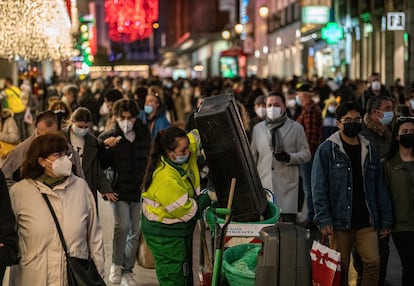The coronavirus isn’t a flu yet
It’s important to plan new models to prevent the virus, but changes should not be made prematurely

After two years of the coronavirus pandemic, five million deaths worldwide, the complete upheaval of the social and economic life and a sixth wave – still ongoing – that has led to more cases and hospitalizations than previous waves, pandemic fatigue is starting to take a toll and we now run the risk of wanting to move to the next stage before it is time to do so.
The fact that the Spanish government has announced a plan to treat Covid-19, when possible, as an endemic disease subject to similar monitoring as the flu does not mean that the pandemic is over nor that we can already compare the virus to the winter flu. Those managing the crisis have a duty to anticipate what’s next, and this debate has taken hold of Europe, even though omicron cases have yet to peak.
It’s obvious that we are in a new situation, which explains the new guidelines. Reducing the quarantine period to seven days makes sense given that most cases are less serious. And the decision to stop doing PCR tests on close contacts, if they don’t have symptoms, prevents healthcare centers from becoming completely overwhelmed. But the virus continues to cause a high number of hospitalizations and deaths, and the World Health Organization (WHO), the European Centre for Disease Control and Prevention and the European Medicines Agency believe it is too soon to treat Covid-19 as if it were a simple flu.
The fact that the Spanish government has announced a plan to treat Covid-19 as an endemic disease subject to similar monitoring as the flu does not mean that the pandemic is over
In order for us to move from a pandemic to an endemic situation, a series of conditions need to be met. Many virologists predict that SARS-CoV-2 could turn into an endemic virus, like the four coronaviruses before it which now cause the common cold, although it is not known whether it will end up being a seasonal virus, or be constantly present, with sporadic outbreaks. The fact that, with the successive variants, we have gone from a mortality rate of 13% at the beginning of the pandemic to the current 1% is a sign that we are heading in that direction. We know that the protection offered by vaccines against infection declines over time and that booster shots will have to be administered, but we don’t know how often this will have to be done, nor if vaccine protection against serious illness will also decline over time. What’s more, the possibility of new variants appearing will remain high until the entire world is vaccinated.
Given this high degree of uncertainty, one would think that the change in model must only be gradual, cautious and reversible. Covid-19 will not turn into the flu from one day to the next if it circulates freely, without any restrictive measures and with the entire preventive strategy based solely on trust in the effectiveness of vaccines. However, we do need to start planning a design for a new control system for when that day comes. For now, the virus demands all our current containment measures.
Tu suscripción se está usando en otro dispositivo
¿Quieres añadir otro usuario a tu suscripción?
Si continúas leyendo en este dispositivo, no se podrá leer en el otro.
FlechaTu suscripción se está usando en otro dispositivo y solo puedes acceder a EL PAÍS desde un dispositivo a la vez.
Si quieres compartir tu cuenta, cambia tu suscripción a la modalidad Premium, así podrás añadir otro usuario. Cada uno accederá con su propia cuenta de email, lo que os permitirá personalizar vuestra experiencia en EL PAÍS.
¿Tienes una suscripción de empresa? Accede aquí para contratar más cuentas.
En el caso de no saber quién está usando tu cuenta, te recomendamos cambiar tu contraseña aquí.
Si decides continuar compartiendo tu cuenta, este mensaje se mostrará en tu dispositivo y en el de la otra persona que está usando tu cuenta de forma indefinida, afectando a tu experiencia de lectura. Puedes consultar aquí los términos y condiciones de la suscripción digital.









































